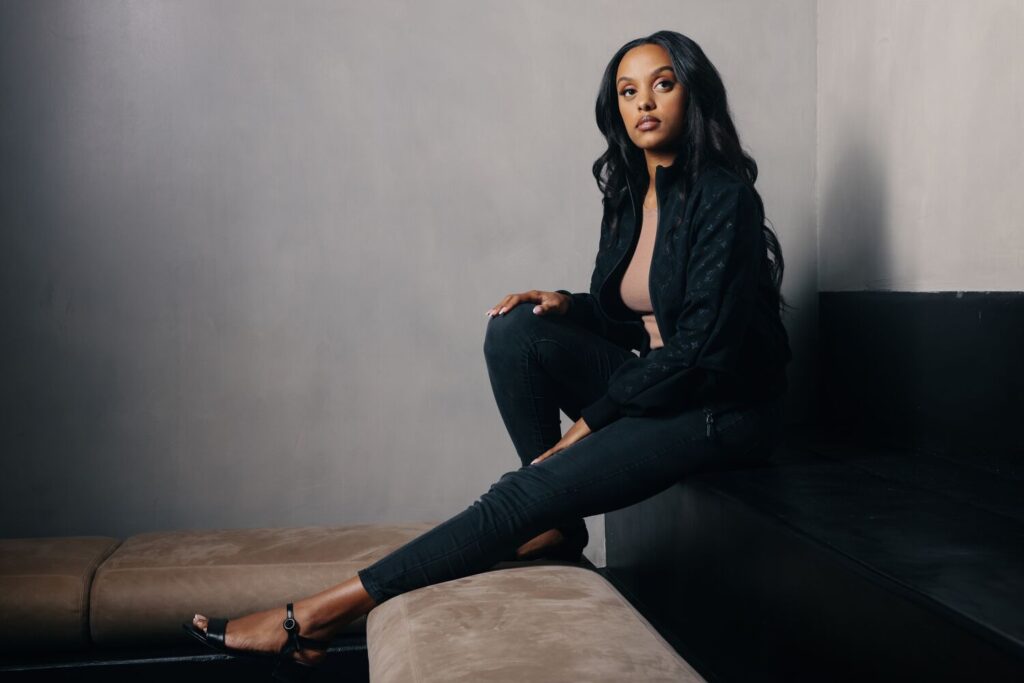In the Jim Crow South of the 1930s and ‘40s, in poor, rural Georgia, forbidden love struggles up through the briars. The teens, Bayou and Leanne, find they can be together only in the dead of night, signaling each other with paper planes. The message received, they head for their spot — a tree away from prying eyes.
“You are the song that I long to hear once more / You are the light that I keep looking for,” sings a velvety young female voice after the story’s over: “And I’ll spend my lifetime / Sending paper airplanes to the moon / Praying they get to you.”
The movie is Tyler Perry‘s “A Jazzman’s Blues”; the song is “Paper Airplanes,” by Canadian singer-songwriter Ruth B.
“Tyler really wanted paper airplanes to be in it, so I worked around that idea — which is funny, that’s how I used to write: I’d pick a word and write around it,” she says, chuckling. “I mean, I hadn’t done it in years, but it was cool to revert to that process.”
The 27-year-old daughter of Ethiopian immigrants to Alberta (birth name: Ruth Berhe) has crafted, along with veteran composer Terence Blanchard, a wistful, jazz-inflected, soulful ballad of longing, of sending out impossible communications, knowing they’ll likely never be received. It’s one of the prettiest songs from a movie this year.
“I love the image of Bayou laying on a rooftop trying to send airplanes to her — as he gets older and throughout different phases in his life, just hoping they get to her.”
In the song, Ruth sings, “Even though it’s been a while / I still think about your smile / Every night before I fall asleep / I find you in my dreams / Somewhere in the trees.”
The musician can’t be blamed for having been surprised to be considered to write the song. As she puts it, “They’d had a little trouble figuring it out before me. They took a chance on me because I’m definitely not that established of a writer. I’m from Canada, not a lot of people know me. So to trust me with something he is so passionate about — like, this was his dream movie, his passion project — meant a lot to me. They were validating me. That is really cool.”
And how did Perry respond to the song? “He was so sweet. He said the first time he heard it, it brought tears to his eyes. It was the song he’d wanted.”
Ruth B. grew up in Alberta, in a house in which her father made a practice of speaking only English, while her mother diligently spoke only the Ethiopian dialect Amharic.
“They both speak English. That was a conscious decision,” says the songwriter. “So my brother and I retained [both languages]. A lot of my growing up was centered around family, friends, music, faith — all the things that make for a rich childhood.
“It was just me, my dad, my brother and my mom, the four of us. We were a little team doing everything together and figuring life out in western Canada. Just great.”
She took part in “every sport you could think of” and became a voracious consumer of fantasy fiction — “Harry Potter” and the “Lord of the Rings” and “Song of Fire and Ice” books among her favorites — but “My heart was always with music. My mom says I was singing as soon as I was born.”
In 2017, she released the album “Safe Haven.” It has accumulated more than 1.3 billion Spotify streams. She has collected six Juno nominations (kind of Canada’s Grammys) , winning once for breakthrough artist.
She doesn’t solely listen to artists of her era; she lists Lauryn Hill and Paul McCartney among her most consequential influences, the Beatles’ ”Blackbird” perhaps her favorite song. However, she relied on Blanchard’s help to steer “Paper Airplanes” toward the ‘40s era of the film (though it doesn’t sound like an artifact of that time, its orchestration restrained, almost atmospheric).
“That’s really his world and not for me at all,” she says, “so he was able to give me references and artists to listen to, and guide me in the direction of the song. From those Zoom conversations, I was able to translate that into the music.”
The singer’s timbre doesn’t resemble the keening of Billie Holiday, but when thinking of singers or songs of that time to compare to “Paper Airplanes,” Lady Day’s lushly romantic “Tenderly” or her achingly yearning “Solitude” come to mind.
“It’s funny,” says Ruth B., “we just shot the music video a week ago at Tyler Perry Studios and we were referencing Billie Holiday a lot in it.”
It’s not hard to imagine Holiday singing lines such as, “And if the world stops spinning / Even then I’ll be singing / Of you, of you / And when my heart stops beating / Even then I’ll be dreaming / Of you, of you.”
“I thought that captured the movie,” says Ruth B. of her song’s bridge, “that unconditional love that you, every now and then, you feel for someone. I feel like that’s kind of it.”

